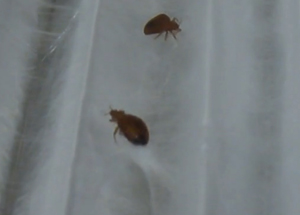Jun 1 2013
Bed bugs now need to watch their step. Researchers at Stony Brook University have developed a safe, non-chemical resource that literally stops bed bugs in their tracks. This innovative new technology acts as a man-made web consisting of microfibers 50 times thinner than a human hair which entangle and trap bed bugs and other insects. This patent-pending technology is being commercialized by Fibertrap, a private company that employs non-toxic pest control methods.
 A screen capture of a video demonstration of the new technology stopping bed bugs in their tracks.
A screen capture of a video demonstration of the new technology stopping bed bugs in their tracks.
The nanotech solution was developed at Stony Brook University’s Center for Advanced Technology in Sensor Materials (Sensor CAT), a program funded by NYSTAR, as part of a statewide effort to encourage greater technological and economic collaboration between industry and research universities.
“Our nanotechnology produces entanglements that are millions of times more dense than woven products such as fabrics or carpets,” said lead researcher Miriam Rafailovich, Distinguished Professor of Materials Science and Engineering and Co-Director in the Program of Chemical and Molecular Engineering at Stony Brook University. “The microfibers trap them by attaching to microstructures on their legs taking away their ability to move, which stops them from feeding and reproducing.”
Successful tests were performed using live bed bugs and termites in Professor Rafailovich’s lab with the assistance of Ying Liu, a scientist with Stony Brook University’s Advanced Energy Research and Technology Center and Stony Brook graduate students Shan He and Linxi Zhang.
Kevin McAllister, Fibertrap’s co-founder added, “We are very excited to move this advancement from the lab to the consumer. Our goal has always been to make a difference for people living in areas where bed bugs are pervasive and difficult to eradicate.”
The microfibers are safe for humans and pets and unlike chemical treatments the insects cannot develop a resistance to it.